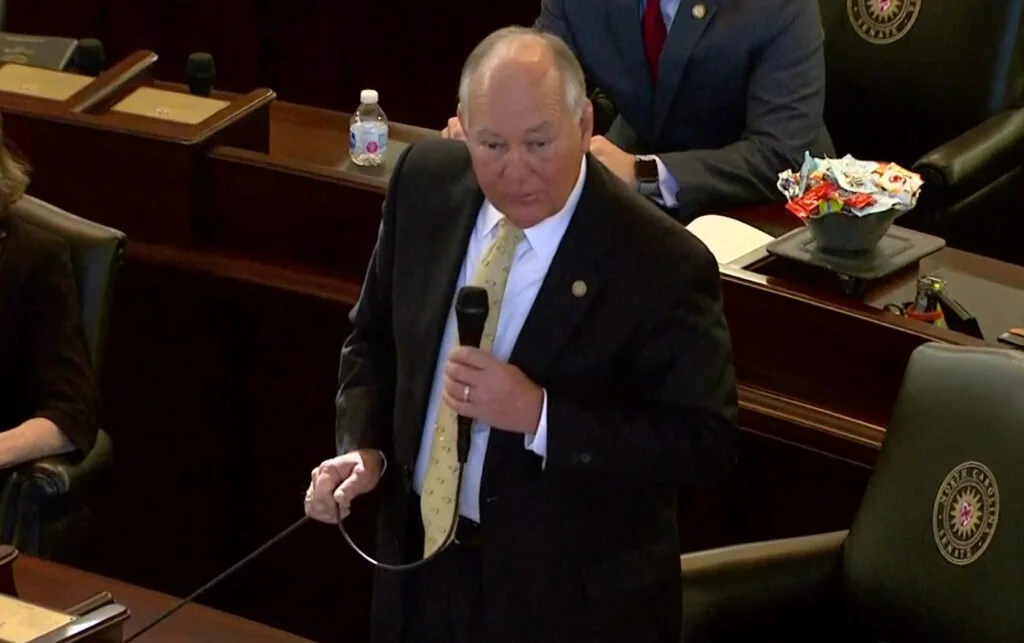State lawmakers gear up for busy 2021-22 session with COVID-19 in focus
Sen. Brent Jackson, R-Sampson, addresses colleagues on the Senate floor. (Screen shot from ncleg.gov)
By David Bass
Carolina Journal News Service
RALEIGH — COVID-19 and the ongoing fallout from the pandemic will likely dominate the 2021-22 session of the General Assembly. On tap for lawmakers is crafting a new budget for the biennium plus drawing new legislative and congressional maps for the next decade based on fresh census data.
A divided government — with Democrats controlling the governor’s office and Republicans helming both chambers of the legislature — means stalemates on many issues and compromises on others are in the offing. Despite predictions a so-called “blue wave” would sweep Republicans out of power in the General Assembly in 2020, the GOP shored up its majorities in both chambers, though it still fell short of a veto-proof majority.
Topping the agenda in the new session is the state’s response to the pandemic.
“I think almost everything else that we do will play off of what the situation is in terms of the virus,” Senate leader Phil Berger, R-Rockingham, recently told the News & Observer. Similarly, House Speaker Tim Moore, R-Cleveland, has said determining how to allocate a COVID-19 disaster-relief package from the federal government is the legislature’s top priority.
Already, Republicans are drawing battle lines over the track record of Gov. Roy Cooper, a Democrat, in rolling out the COVID-19 vaccine.
“The executive branch is now in the unfortunate position of having to build the plane while flying it, which is not a recipe for success,” said Sen. Jim Perry, R-Lenoir. “They must act with urgency to get shots into people’s arms.”
In a new conference Tuesday, Jan. 12, N.C. health secretary Dr. Mandy Cohen said officials are working to get out the vaccine as quickly as possible, although she only offered vague details on how that would be accomplished.
COVID-19 concerns will also weigh heavily on budget debates. Republican lawmakers and Cooper haven’t come to terms on a budget since 2018, meaning the state has been running on a series of mini-budgets to continue spending for the past two years. In May 2020, the state estimated it would face a $2 billion shortfall heading into this year. To cope, North Carolina has $1.1 billion in a rainy day fund plus an additional $1.5 billion in an unreserved balance fund to help with shortfalls.
“Because of steps taken over the past 10 years, we have the financial cushion of reserves and unspent revenues to bolster our state’s finances,” Berger said.
In past years, Medicaid expansion and teacher pay raises have been sticking points between Cooper and Republican lawmakers. In an interview with WUNC-TV, House Majority Leader John Bell, R-Greene, said opposition to expanding Medicaid remained strong in his caucus, but Republicans are willing to look at other ways to bring health care to rural areas, including telehealth, associated health-care plans, and putting more providers in rural communities.
Even so, it’s possible lawmakers and Cooper could meet in the middle on more issues this session. In a rare instance of bipartisanship, for example, lawmakers and Cooper agreed on a $1 billion COVID-19 relief package in September.
And in a speech on the chamber floor Wednesday, Jan. 13, the Democrats’ new leader in the House, Rep. Robert Reives of Chatham County, called for civil discourse and agreement where possible. “The citizens don’t want to hear us bickering this year,” he said. “They don’t want to hear us fighting. They don’t want to hear partisan disagreements. They want to hear civil discourse and disagreements about the best way that we can send North Carolina forward.”
One area sure to draw partisan ire is redistricting. As in 2010, Republicans will be in charge of drawing new maps based on census data from last year. The data are expected to show population gains sufficient to increase North Carolina’s U.S. House delegation from 13 to 14 seats. Lawmakers will also redraw lines for state House and Senate seats.
Cooper is prevented from state law from vetoing the maps, putting Republican lawmakers decidedly in the driver’s seat. The new maps will be used for elections through 2030.
Although the session convened Wednesday, the day’s business was largely ceremonial. Electing new leadership and laying the groundwork for what’s to come. Lawmakers are expected back in Raleigh on Jan. 27 to get down to work.



